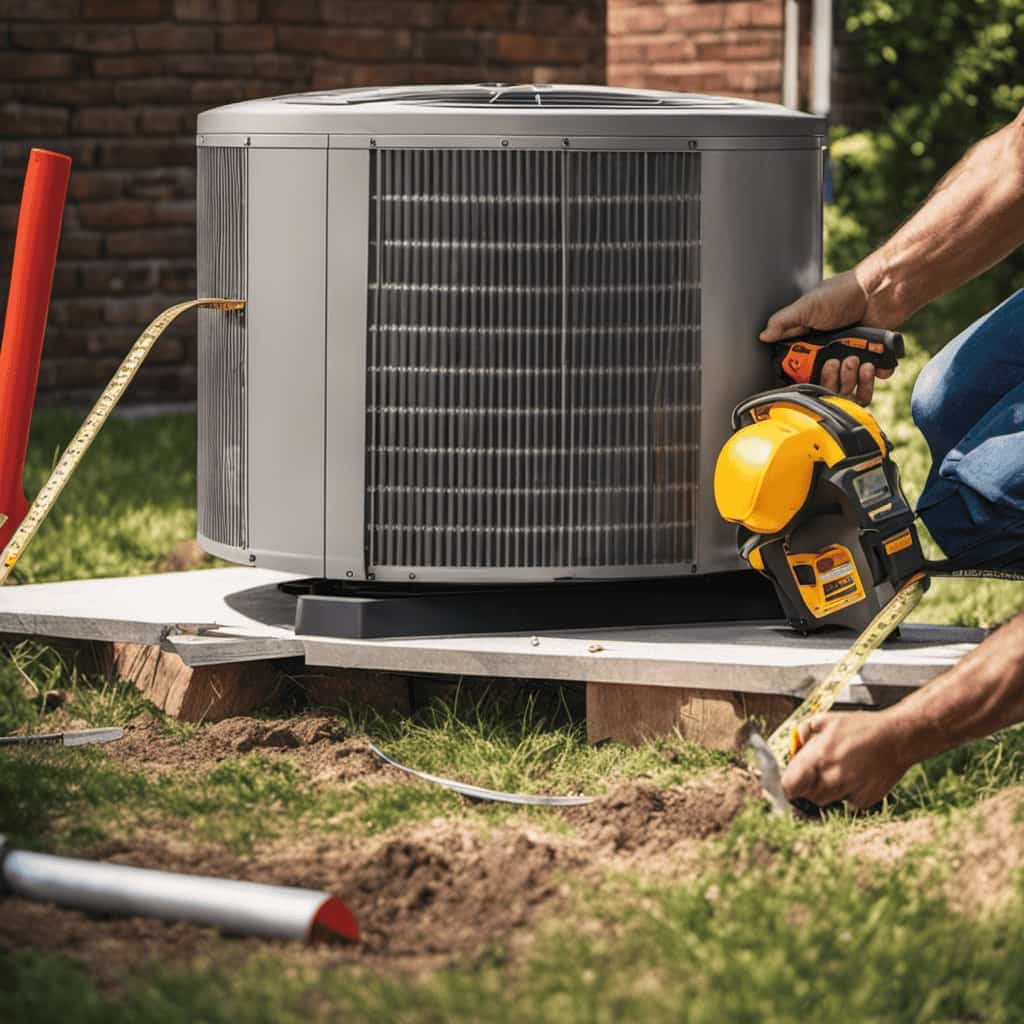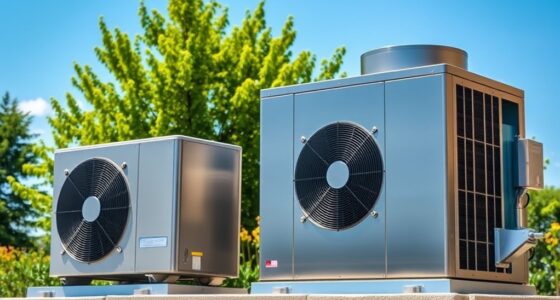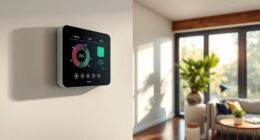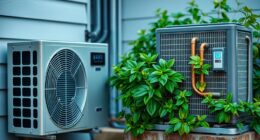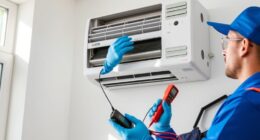Are you aware that there may be hidden costs associated with installing a heat pump HVAC system? This article will reveal the actual expenses involved in heat pump HVAC installation.
From the equipment itself to additional expenses like ductwork modifications and electrical upgrades, there are several factors to consider.
We will also explore unexpected costs and maintenance fees.
So, join us as we uncover the hidden charges associated with heat pump HVAC installation.

Key Takeaways
- The initial cost of heat pump HVAC equipment may be higher compared to traditional systems, but long-term energy efficiency benefits can result in significant savings on utility bills.
- Ductwork modifications are necessary to ensure proper airflow and distribution of conditioned air, and may require resizing, reconfiguring, sealing, and insulating the existing ducts.
- Electrical upgrades may be required to support the new heat pump HVAC system, such as adding dedicated circuits, increasing electrical capacity, and updating outdated wiring.
- Significant permit and inspection fees are associated with heat pump HVAC installation, and failure to obtain proper permits and inspections can result in penalties or legal issues.
The Cost of Heat Pump HVAC Equipment
We’ll now discuss the cost of heat pump HVAC equipment.
When considering the installation of heat pump HVAC systems, it’s important to take into account the cost of the equipment itself. Heat pump HVAC systems can range in price depending on factors such as size, brand, and energy efficiency ratings.
The cost of installation can also vary depending on the complexity of the job and any additional components required. However, it’s important to note that while the initial cost of heat pump HVAC equipment may be higher compared to traditional systems, the long-term energy efficiency benefits can result in significant savings on utility bills.
Heat pump HVAC systems are known for their ability to transfer heat rather than generate it, making them highly energy-efficient and environmentally friendly options for heating and cooling homes.

Additional Expenses for Ductwork Modifications
The installation of a heat pump HVAC system may require additional expenses for ductwork modifications. These modifications are necessary to ensure proper airflow and distribution of conditioned air throughout the building.
Here are four important considerations for ductwork modifications:
-
Sizing: Existing ducts may need to be resized to meet the requirements of the heat pump system. This ensures optimal performance and efficiency.
-
Reconfiguration: The layout of the ductwork may need to be reconfigured to accommodate the new system. This may involve rerouting or adding new ducts.

-
Sealing and Insulation: Ductwork should be properly sealed and insulated to prevent air leaks and minimize energy loss.
-
Airflow Balancing: Balancing the airflow is crucial to ensure consistent temperatures throughout the building. This may involve adjusting dampers or installing additional registers.
By considering these factors, you can ensure that your heat pump HVAC system operates efficiently and effectively.
Now, let’s move on to discussing the hidden charges for electrical upgrades.

Hidden Charges for Electrical Upgrades
When it comes to installing a heat pump HVAC system, one often overlooked expense is the electrical upgrades required to support the new system. These upgrades can include adding dedicated circuits, increasing electrical capacity, and updating outdated wiring.
These unexpected costs can significantly impact the overall budget for the installation project, so it’s important to consider them when planning for a heat pump HVAC installation.
Unexpected Electrical Upgrade Costs
Before we proceed, it’s important to address the unexpected electrical upgrade costs that may arise during the installation of a heat pump HVAC system. These costs can have a significant impact on the overall budget and shouldn’t be overlooked. Here are four key points to consider:
-
Increased Energy Efficiency: Upgrading the electrical system to accommodate a heat pump HVAC system can improve energy efficiency. This upgrade ensures that the system operates optimally, reducing energy consumption and lowering utility bills.
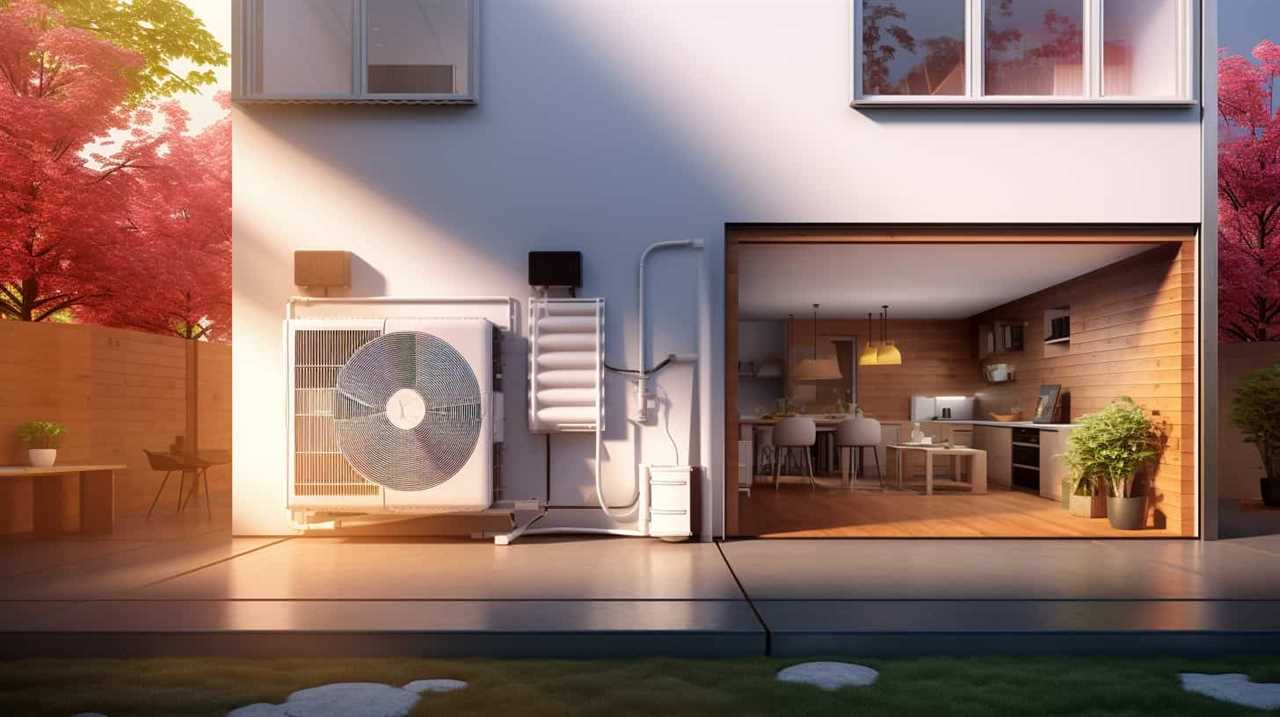
-
Safety Hazards: Outdated electrical systems may not be able to handle the increased electrical load of a heat pump HVAC system. This can lead to potential safety hazards, such as overloaded circuits or electrical fires. Upgrading the electrical system mitigates these risks and ensures a safe installation.
-
Upgraded Wiring: The installation of a heat pump HVAC system often requires upgraded wiring to support the increased power requirements. This may involve rewiring or installing additional circuits, which can add to the overall cost.
-
Electrical Panel Upgrade: In some cases, the existing electrical panel may need to be upgraded to accommodate the additional load from the heat pump HVAC system. This upgrade ensures that the electrical system can handle the increased demand without tripping breakers or causing damage.
Considering these unexpected electrical upgrade costs is crucial to fully understanding the impact on energy efficiency and potential safety hazards that may arise during the installation of a heat pump HVAC system. These costs should be factored into the overall budget to avoid any surprises or setbacks.

Now, let’s explore the next section: ‘Impact on Overall Budget’.
Impact on Overall Budget
Let’s delve into the impact on our overall budget by considering the hidden charges for electrical upgrades that may arise during the installation of a heat pump HVAC system. These electrical upgrades are often necessary to accommodate the increased power requirements of the heat pump.
While the cost of the heat pump itself is a significant investment, the additional electrical upgrades can further strain the budget. Not only can these upgrades add to the overall cost, but they can also impact the timeline of the installation process. Depending on the complexity of the upgrades, there’s a potential for delays in completing the installation. These delays can further disrupt the comfort and efficiency of the HVAC system.
Now, let’s move on to the next section where we’ll discuss the permit and inspection fees associated with heat pump HVAC installation.

Permit and Inspection Fees
We need to consider the significant permit and inspection fees associated with heat pump HVAC installation. These fees can have an impact on the timeline of the installation process, as they often require additional time for approval and scheduling. Local building codes play a crucial role in determining the requirements for permits and inspections.
Here are four key points to understand about permit and inspection fees:
-
Cost: Permit and inspection fees can vary depending on the location and the complexity of the installation. It’s essential to budget for these fees when planning the overall cost of the project.
-
Application Process: The process of obtaining permits and scheduling inspections can be time-consuming. It involves submitting detailed plans and specifications for review and obtaining necessary approvals.

-
Compliance: Local building codes dictate the specific requirements for HVAC installations. Inspections ensure that the installation meets these codes and regulations, guaranteeing the safety and efficiency of the system.
-
Delays: Failure to obtain the required permits or pass inspections can lead to project delays. It’s crucial to factor in the time needed for these processes to avoid any unforeseen setbacks.
Considering the impact of permit and inspection fees, it’s essential to also evaluate the cost of hiring professional HVAC contractors.
Cost of Hiring Professional HVAC Contractors
To accurately assess the total cost of heat pump HVAC installation, we must consider the expenses associated with hiring professional HVAC contractors.

While some homeowners may opt for a do-it-yourself (DIY) installation to save money, it’s essential to understand the potential hidden costs and risks involved in this approach.
Hiring professional HVAC contractors ensures that the installation is done correctly and efficiently, minimizing the chances of costly mistakes. These contractors possess the necessary skills, knowledge, and experience to handle the complexities of heat pump installation.
Although the upfront cost of hiring professionals may be higher, it can save homeowners from potential costly repairs or replacements down the line. Additionally, hidden fees such as warranty voids due to DIY installation mistakes can further add to the overall cost.
Ultimately, investing in professional HVAC contractors can provide peace of mind and long-term savings.

Potential Costs for Removing Existing HVAC Systems
When removing existing HVAC systems, there are several potential costs to consider.
First, there may be disposal fees for properly getting rid of the old system, which can vary depending on the size and type of the unit.
Additionally, labor costs for the removal process should be factored in, as it can be a complex and time-consuming task.
Disposal Fees for HVAC
There are several potential disposal fees associated with removing existing HVAC systems, which homeowners should be aware of when considering heat pump HVAC installation. These fees can vary depending on factors such as the type and size of the system being removed, as well as the location and accessibility of the property.
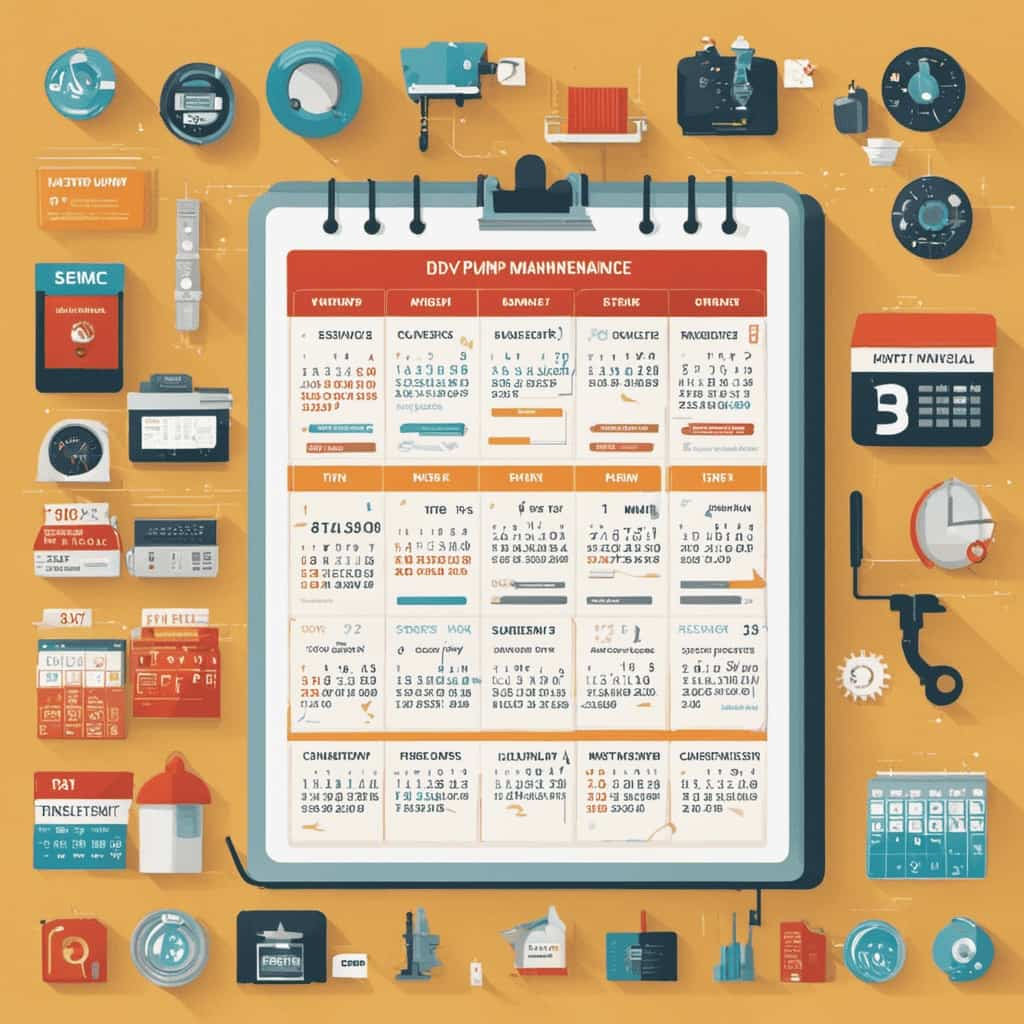
Here are four common disposal fees that homeowners may encounter:
-
Recycling fees: Many HVAC systems contain materials that can be recycled, such as metal components and refrigerants. Homeowners may be charged a fee for the proper recycling of these materials.
-
Disposal fees: If the HVAC system can’t be recycled, it will need to be disposed of in a proper manner. This may involve transporting the system to a designated disposal facility and paying a disposal fee.
-
Labor fees: Removing an existing HVAC system requires skilled labor and specialized equipment. Homeowners may need to cover the cost of labor fees for the removal process.
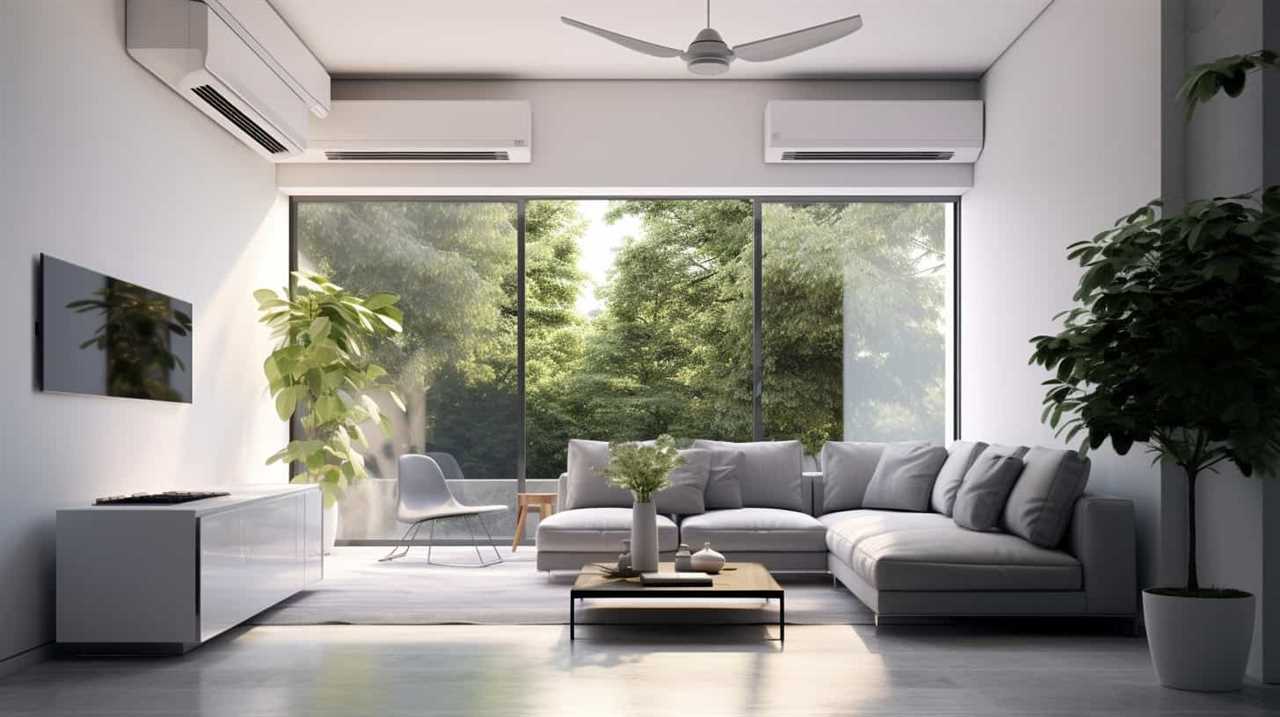
-
Permit fees: In some areas, homeowners may be required to obtain permits before removing an HVAC system. These permits often come with associated fees that need to be paid.
When considering heat pump HVAC installation, homeowners should factor in these potential disposal fees into their budget. It’s also advisable to explore financing options that can help cover these additional costs.
Labor Costs for Removal
Our team of experts will outline the labor costs associated with removing existing HVAC systems.
When it comes to removing an old HVAC system, labor costs can vary depending on factors such as system complexity, accessibility, and the size of the unit. On average, labor costs for removal can range from $500 to $1500. These costs include the disconnection of the system, removal of components, and disposal of the old equipment.

However, it’s important to note that additional costs may arise if there’s any potential damage to the surrounding areas during the removal process. In such cases, repairs may be necessary, which could further increase the labor costs.
It’s crucial to hire experienced professionals to ensure a smooth removal process and minimize the risk of potential damage repairs.
Potential Damage Repairs
We must consider potential damage repairs and the associated costs when removing existing HVAC systems. Here are four important points to understand about potential damage repairs:
-
Structural Damage: Removing an HVAC system can sometimes result in unintended structural damage to the building. This can include damage to walls, ceilings, or flooring, which may require repairs before installing the new heat pump system.

-
Electrical Damage: Disconnecting the existing HVAC system can lead to electrical damage, especially if it wasn’t properly installed or maintained. Electrical repairs may be necessary to ensure the safe installation of the new heat pump system.
-
Plumbing Damage: In some cases, removing an HVAC system can cause damage to plumbing lines, such as water supply or drainage pipes. Repairing any plumbing damage is crucial to prevent leaks or other issues with the new system.
-
Insurance Coverage: It’s important to check if your insurance policy covers potential damage repairs during the HVAC removal process. This can help alleviate some of the financial burden associated with unexpected repairs.
Considering potential damage repairs is essential for a successful heat pump HVAC installation. While the costs may vary depending on the extent of the damage, addressing these repairs upfront can bring potential long-term benefits and ensure a smooth transition to the new system.

Expenses for Thermostat and Control Upgrades
Let’s explore the costs of upgrading thermostats and controls for your heat pump HVAC system. Upgrading your thermostat and controls may be necessary when installing a heat pump HVAC system, as not all thermostats are compatible with these systems. The installation complexity of heat pump HVAC systems requires advanced controls that can handle the unique features and functions of the system. This means that you may need to invest in a new thermostat and control system that is specifically designed for heat pumps. To give you an idea of the potential expenses, here is a table outlining the average costs for thermostat and control upgrades:
| Item | Average Cost |
|---|---|
| Programmable Thermostat | $100 – $250 |
| Smart Thermostat | $200 – $400 |
| Advanced Control System | $500 – $1000 |
Now that we’ve discussed the expenses for thermostat and control upgrades, let’s move on to the next section where we’ll explore the unexpected costs for refrigerant lines and insulation.
Unexpected Costs for Refrigerant Lines and Insulation
There are several unexpected costs associated with refrigerant lines and insulation during heat pump HVAC installation. These costs can add up quickly and catch homeowners off guard. Here are four potential expenses to consider when it comes to refrigerant line installation and insulation expenses:
-
Extra refrigerant line length: Depending on the layout and design of your home, additional refrigerant lines may be needed to connect the heat pump to the indoor and outdoor units. This can increase material and labor costs.

-
Insulation upgrades: Proper insulation is essential for energy efficiency and preventing heat loss. If your existing insulation is insufficient or outdated, you may need to invest in insulation upgrades during the installation process.
-
Refrigerant line insulation: It’s crucial to insulate the refrigerant lines to prevent heat gain or loss. This insulation material can incur additional costs, especially if specialized or higher-quality insulation is required.
-
Custom fittings and connectors: Every HVAC installation is unique, and sometimes custom fittings and connectors are necessary to ensure a proper and secure connection between the refrigerant lines and the heat pump unit.
Taking these unexpected costs into account when budgeting for your heat pump HVAC installation can help you avoid financial surprises down the line. Now, let’s move on to discuss maintenance and service agreement fees.

Maintenance and Service Agreement Fees
When it comes to heat pump HVAC systems, maintenance and service agreement fees are an important aspect to consider. Service contracts offer numerous benefits, such as priority service, discounted repairs, and regular maintenance visits.
While these agreements may come with an extra cost, they often include cost-saving maintenance plans that can help extend the lifespan of your heat pump and prevent major breakdowns.
But is the extra expense worth it? Let’s delve into the details and weigh the pros and cons.
Service Contract Benefits
We highly recommend signing up for a service contract to enjoy the many benefits and savings it offers, including regular maintenance and service as well as agreement fees.
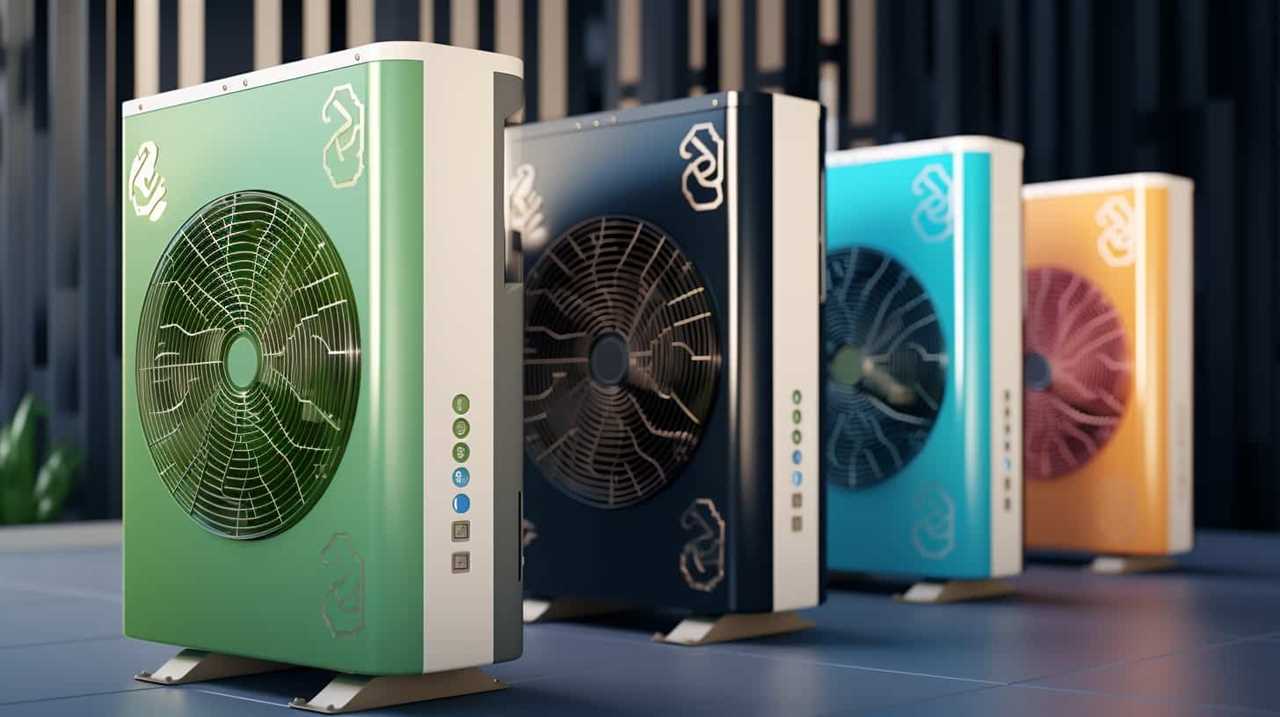
Here are four reasons why service contract benefits are worth considering:
-
Cost Savings: Service contracts often include cost-saving maintenance plans that cover routine inspections, cleanings, and tune-ups. By regularly maintaining your heat pump HVAC system, you can prevent costly repairs and extend its lifespan.
-
Priority Service: With a service contract, you’ll typically receive priority scheduling for any repairs or service calls. This means you won’t have to wait in long queues during peak seasons and can get your HVAC system back up and running quickly.
-
Expert Technicians: Service contracts often provide access to highly trained and experienced technicians who specialize in heat pump HVAC systems. These professionals have the knowledge and skills to diagnose issues accurately and provide efficient solutions.
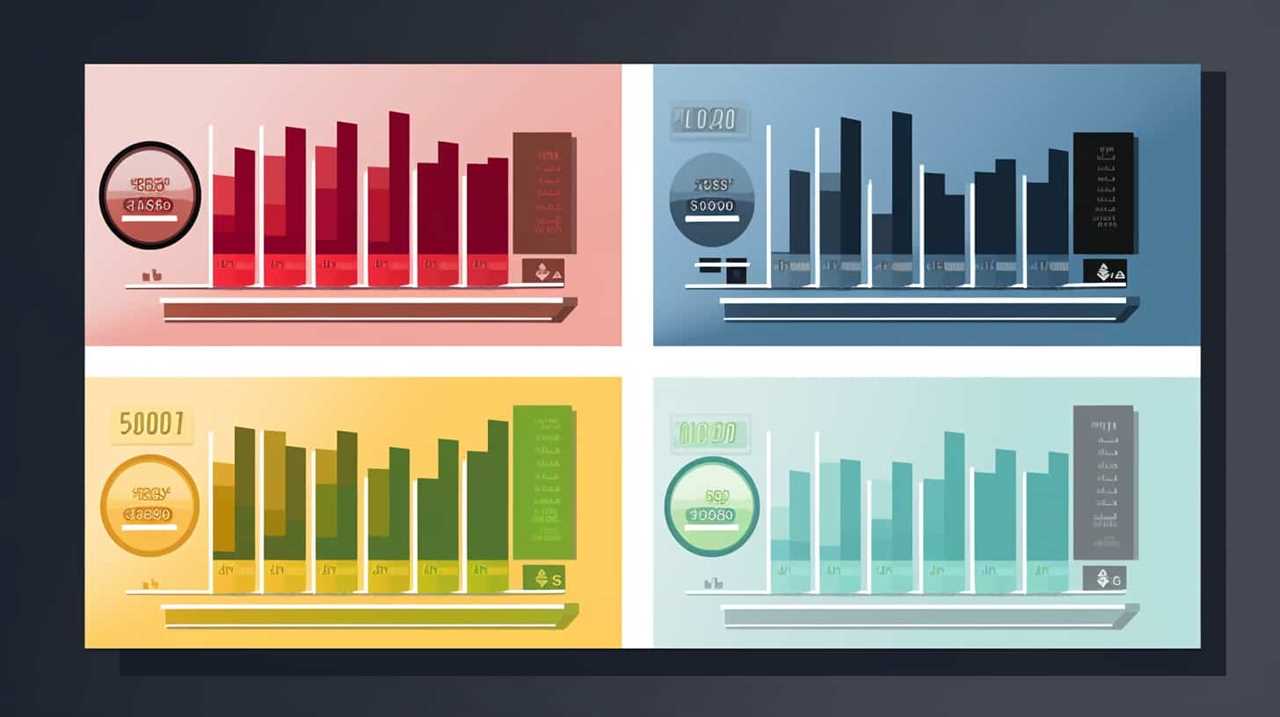
-
Peace of Mind: Knowing that your HVAC system is being regularly maintained and serviced by professionals can give you peace of mind. You can rest easy knowing that your system is operating efficiently, reducing the risk of sudden breakdowns and costly emergency repairs.
Cost-Saving Maintenance Plans
We recommend considering cost-saving maintenance plans, as they can help you save money on routine maintenance and service agreement fees for your heat pump HVAC system. By signing up for a maintenance plan, you can ensure that your system receives regular check-ups and necessary repairs, which can prevent costly breakdowns in the future. These plans typically include services such as cleaning and inspecting the system, lubricating moving parts, checking electrical connections, and replacing filters. In addition to the peace of mind that comes with regular maintenance, these plans can also offer long-term savings. Here is a table illustrating the potential savings of a maintenance plan compared to paying for individual services:
| Maintenance Plan | Individual Services |
|---|---|
| $X/year | $X/year |
As you can see, opting for a maintenance plan can save you money in the long run. Now, let’s explore whether these cost-saving strategies are worth the extra expense.
Worth the Extra Expense?
Let’s weigh the value of maintenance and service agreement fees to determine if they’re worth the extra expense. When considering the long-term savings and hidden benefits, it becomes clear that these fees are indeed worthwhile investments.

Here are four reasons why:
-
Preventive Maintenance: Regular maintenance ensures optimal performance and minimizes the risk of breakdowns, leading to reduced repair costs in the long run.
-
Extended Equipment Lifespan: By addressing minor issues before they escalate, maintenance agreements help prolong the life of your heat pump, saving you money on premature replacements.
-
Energy Efficiency: Properly maintained heat pumps operate more efficiently, resulting in lower monthly energy bills.

-
Priority Service: With a service agreement, you’ll receive prompt attention when you need it most, minimizing downtime and discomfort.
Financing Options and Interest Rates
When considering heat pump HVAC installation, it is important to explore the various financing options and interest rates available. Financing options for heat pump HVAC installation typically include loans from banks, credit unions, or specialized HVAC financing companies. Interest rates can vary depending on the lender and the borrower’s creditworthiness. Loan terms can range from a few years to several decades, allowing homeowners to choose a repayment plan that fits their budget. Credit requirements may also vary, with some lenders offering loans to borrowers with lower credit scores. Payment plans can be structured as fixed monthly payments or as a percentage of the homeowner’s energy savings. To help you understand the different financing options and interest rates, we have provided a table below:
| Lender | Interest Rate | Loan Term |
|---|---|---|
| Bank A | 3.5% | 10 years |
| Bank B | 4.2% | 15 years |
| HVAC Financing Co. | 5.0% | 20 years |
Frequently Asked Questions
Are There Any Tax Credits or Rebates Available for Heat Pump HVAC Installation?
Yes, there are tax credits and rebates available for heat pump HVAC installation. These financial benefits, such as tax incentives, can help offset the costs and make the installation more affordable.
How Long Does the Installation Process Typically Take?
The installation timeline for a heat pump HVAC system can vary based on several factors. These include the size of the system, the complexity of the installation, and any necessary modifications to the existing ductwork.
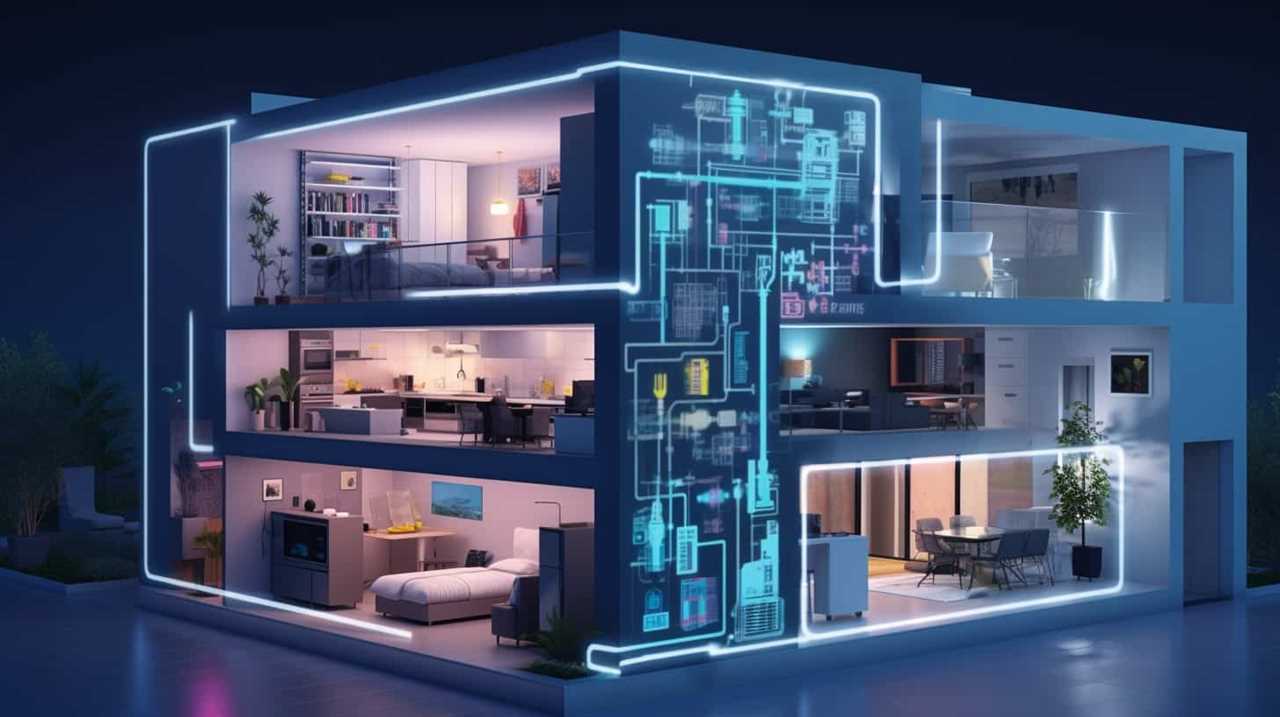
Are There Any Potential Health or Environmental Concerns Associated With Heat Pump HVAC Systems?
Health concerns and environmental impacts should be considered when installing heat pump HVAC systems. It’s important to assess potential risks such as air quality, noise pollution, and the energy source used for heat production.
Can a Heat Pump HVAC System Be Installed in Any Type of Home or Building?
Installing a heat pump HVAC system in any type of home or building can present challenges. However, the benefits of these systems, such as energy efficiency and versatility, make them suitable for a wide range of residential and commercial properties.
Are There Any Ongoing Maintenance Costs Associated With Owning a Heat Pump HVAC System?
Yes, there are ongoing maintenance costs associated with owning a heat pump HVAC system. Regular maintenance is essential for optimal performance and energy efficiency. The benefits of regular maintenance include prolonging the system’s lifespan and avoiding costly repairs.
Conclusion
In conclusion, the installation of a heat pump HVAC system comes with several hidden costs that can quickly add up.

From equipment expenses to ductwork modifications and electrical upgrades, the financial burden can be overwhelming. Additionally, permit fees, professional contractor fees, and thermostat upgrades further contribute to the overall cost.
Furthermore, unexpected expenses for refrigerant lines and insulation can catch homeowners off guard.
It’s crucial to consider these hidden charges and explore financing options wisely. Prepare for a rollercoaster of expenses on your journey to a more efficient and comfortable home.

